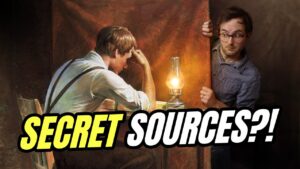Reviews
User Score
Rate This
Descriptions:
This episode covers some of the major events of Christian and Roman history between about 330 AD until 600 AD. Dave talks about the fall of the Western Roman Empire, the persecution of Paganism, and the steady rise of the Bishop of Rome (who would later hold the title of Pope).
Transcript of this episode and possibly additional notes on our website: https://bit.ly/35rWhCM
More on the Council of Ephesus: http://bit.ly/2Iay3lP
More on the Council of Chalcedon: http://bit.ly/2waVJUo
More on the First Council of Constantinople: http://bit.ly/32bZMeU
More on the Second Council of Constantinople: http://bit.ly/3cd2Zzy
More on the fall of the Western Empire: http://bit.ly/382BsNU
Even more on the fall of the Western Empire: http://bit.ly/3adoyOJ
History of the title, “Pope”: http://bit.ly/2vu6iSv / http://bit.ly/2TvJfhO / http://bit.ly/2PNV1TN
Some info on the development of the papacy: http://bit.ly/3a8jYB0
The problem of jurisdictional authority in the early church: http://bit.ly/2vGNW0j
Papal supremacy developed over time? http://bit.ly/39Om1dm
More on the development of papal supremacy: http://bit.ly/3bTRxbG
Read the Canons of the First Council of Constantinople: http://bit.ly/2HWk2I7
Some key events from 4th century Christianity: http://bit.ly/3bNINE2
More info on the rise of Christianity: http://bit.ly/39SgTVL
More on Emperor Julian “the Apostate”: http://bit.ly/2VatDTq
More on Emperor Jovian (who I didn’t mention in the episode): http://bit.ly/39RPnYk
Pagan temples raided to build Constantinople?: http://bit.ly/2Ph2QRQ
Complete chronological list of Roman Emperors: http://bit.ly/2um52QM
Bishop of Rome gaining secular authority: http://bit.ly/2HM6qPw / http://bit.ly/37NX1ll
Source for the quote from the Catholic theologian: http://bit.ly/385ggqu
Is this segment scripted? Yes! Here’s why: https://bit.ly/2Gf3pIS
Watch more Faith and Beliefs videos: https://bit.ly/2BlOxEB
Chat with Dave on Facebook: https://bit.ly/2QQ0HKR
NOTES:
-Constantinople was built on the location of an older city called Byzantium. Initially, Constantine named the new city “New Rome,” but after his death it was renamed Constantinople, meaning, “City of Constantine.” After the fall of the Western Roman Empire, the Eastern Roman Empire would come to be known as the Byzantine Empire.
-Canon #6 of the Nicene Creed has long been the subject of discussion between Catholics and non-Catholic Christians as it deals with a very important question: Did the Bishop of Rome always have total authority and jurisdiction over the Church and every other bishop of the Church? Interpretations of Canon #6 vary. For example, here is an example of a non-Catholic interpretation: http://bit.ly/395FYfK. And here is a Catholic interpretation: http://bit.ly/2HY5QOS. Feel free to come to your own conclusions.
-The First Council of Constantinople named the bishop of Constantinople as the Church’s second most honorable bishop, after the Bishop of Rome, basically for no other reason than the fact that Constantinople was the new center of … everything (Canon #3). But while the Bishop of Rome was probably more influential than any other bishop at this point in history, it’s important to recognize that this canon is not recognizing that the Bishop of Rome has authority over all of Christendom, but that he is simply the most “honorable” bishop. As a side-note: This canon was super-controversial, because it meant that the honor of the bishops of Alexandria/Antioch/Jerusalem was diminished. And, contrary to Constantinople, those cities had played a huge role in the early faith.
-The coming forth of the Bible canon really deserves its own episode, but just as a side-note: The Old Testament canon was more easily decided upon than the New Testament, by virtue of its scriptures having been around for much longer. In terms of the New Testament, the four gospels were accepted more quickly than the other books. It seems the Pauline letters were probably some of the more controversial bits that took a little more time to be accepted fully. It’s hard to say when exactly the Bible was officially canonized, because it was a process that happened over time. This is evident by the fact that the lists of OT/NT books are revisited and affirmed in multiple councils/synods/meetings. Also, different sects of Christianity sometimes came to different conclusions about which books they’d recognize as scriptural.
SUBSCRIBE:
http://saintsunscripted/subscribe
Follow Us:
Facebook: https://www.facebook.com/SaintsUnscripted/
Instagram: https://www.instagram.com/saintsunscripted/
Twitter: https://twitter.com/SaintsUnscript
Follow the Hosts:
Kwaku: https://www.instagram.com/kwakuel/
Justin: https://www.instagram.com/motioncoaster/
Mimi: https://www.instagram.com/mimi.bascom/
David: https://www.instagram.com/davidesnell/
The Sunday Pews (by David): https://www.instagram.com/thesundaypews/










